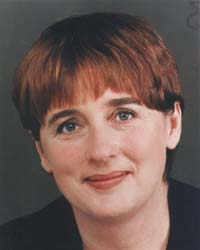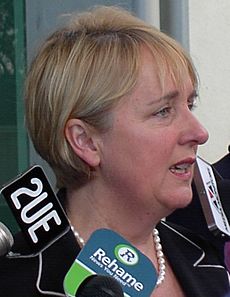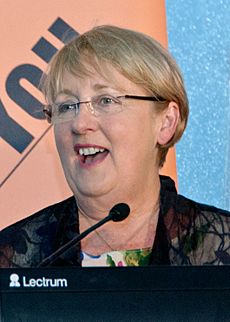Jenny Macklin facts for kids
Quick facts for kids
Jenny Macklin
|
|
|---|---|
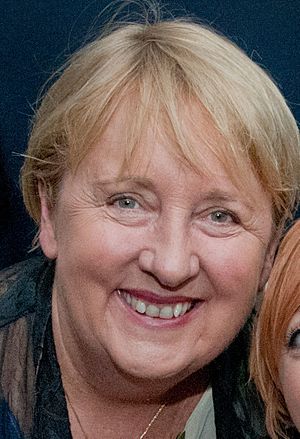
Macklin in 2013
|
|
| Minister for Disability Reform | |
| In office 14 December 2011 – 18 September 2013 |
|
| Prime Minister | Julia Gillard Kevin Rudd |
| Preceded by | Office established |
| Succeeded by | Jane Prentice (2016) |
| Minister for Families, Community Services and Indigenous Affairs | |
| In office 3 December 2007 – 18 September 2013 |
|
| Prime Minister | Kevin Rudd Julia Gillard |
| Preceded by | Mal Brough |
| Succeeded by | Kevin Andrews as Minister for Social Services Nigel Scullion as Minister for Indigenous Affairs |
| Deputy Leader of the Opposition | |
| In office 22 November 2001 – 4 December 2006 |
|
| Leader | Simon Crean Mark Latham Kim Beazley |
| Preceded by | Simon Crean |
| Succeeded by | Julia Gillard |
| Deputy Leader of the Labor Party | |
| In office 22 November 2001 – 4 December 2006 |
|
| Leader | Simon Crean Mark Latham Kim Beazley |
| Preceded by | Simon Crean |
| Succeeded by | Julia Gillard |
| Member of the Australian Parliament for Jagajaga | |
| In office 2 March 1996 – 11 April 2019 |
|
| Preceded by | Peter Staples |
| Succeeded by | Kate Thwaites |
| Personal details | |
| Born |
Jennifer Louise Macklin
29 December 1953 Brisbane, Queensland, Australia |
| Political party | Labor |
| Domestic partner | Ross Turner |
| Children | 3 |
| Alma mater | University of Melbourne |
| Occupation | Researcher |
Jennifer Louise Macklin (born 29 December 1953) is a former Australian politician. She was a member of the Australian Parliament for 23 years.
From 2001 to 2006, she was the deputy leader of the Australian Labor Party (ALP). When the ALP won the 2007 election, she became a government minister. She served as Minister for Families, Community Services and Indigenous Affairs and Minister for Disability Reform. She retired from politics in 2019.
Contents
Early Life and Education
Jenny Macklin was born in Brisbane, Queensland, on 29 December 1953. Her father was an engineer, and she grew up in country Victoria. She attended high school in Wangaratta and spent a year in Japan as an exchange student.
After high school, Macklin studied at the University of Melbourne. She graduated with a degree in Commerce.
Career Before Politics
After university, Macklin worked as a researcher at the Australian National University. She later joined the Parliamentary Library, where she specialized in economics.
In 1981, she became a research coordinator for the Labor Resource Centre in Melbourne. From 1985 to 1988, she was an adviser to Victoria's state health minister.
In 1990, Macklin was chosen to lead the National Health Strategy. This group was created to review Australia's healthcare system. She later directed the Australian Urban and Regional Development Review from 1993 to 1995.
Political Career
In 1994, Macklin was selected by the Labor Party to run for a seat in parliament for the electorate of Jagajaga.
In Opposition (1996–2007)
Macklin was elected to parliament in 1996. Her party, Labor, was not in government, so she became part of the "opposition." In politics, the opposition's job is to question the government and suggest different ideas.
She held several roles in the shadow ministry, which is like a practice cabinet for the opposition party. After the 1998 election, she became the Shadow Minister for Health.
In 2001, Macklin was elected as the deputy leader of the Labor Party. She was the first woman to hold a leadership role in either of Australia's major political parties. She remained deputy leader under three different leaders: Simon Crean, Mark Latham, and Kim Beazley.
In 2006, Kevin Rudd became the new leader of the Labor Party, and Julia Gillard became the deputy leader. Macklin was then appointed to new roles, focusing on families, community services, and Indigenous affairs.
In Government (2007–2013)
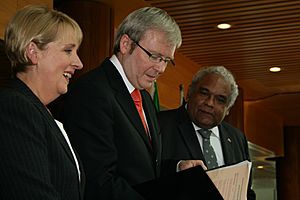
After Labor won the 2007 election, Macklin became a government minister. She was in charge of important social policies that helped many Australians.
Working with Indigenous Australians
As Minister for Indigenous Affairs, Macklin played a key role in the Apology to Australia's Indigenous peoples in 2008. Prime Minister Kevin Rudd delivered the apology for past government policies that had harmed Indigenous families.
She also helped create the Closing the Gap plan. This was a long-term strategy to improve health, education, and living conditions for Indigenous Australians.
National Disability Insurance Scheme (NDIS)
In 2011, Macklin was also made the Minister for Disability Reform. She led the creation of the National Disability Insurance Scheme (NDIS). The NDIS is a major program that gives people with a permanent and significant disability the support they need.
The NDIS began in 2013 and was a huge step forward in social policy for Australia.
Paid Parental Leave
Macklin was responsible for creating Australia's first national Paid Parental Leave scheme. Before this program started in 2011, Australia was one of the few developed countries without one.
The scheme gives new parents time off work with pay to care for their newborn baby. It provides 18 weeks of pay at the national minimum wage.
Other Important Reforms
- Dad and Partner Pay: In 2013, Macklin introduced a program that gives fathers and partners two weeks of paid leave. This helps them support new mothers and bond with their new baby.
- Apology to Forgotten Australians: As Families Minister, Macklin helped organize a national apology to the Forgotten Australians. These were children who grew up in institutions, often facing hardship. The apology, given in 2009, acknowledged their suffering.
Return to Opposition and Retirement
The Labor Party lost the 2013 election, and Macklin returned to the opposition. She continued to work on issues like families, social services, and disability reform in the shadow ministry.
On 6 July 2018, Macklin announced that she would not run in the next election and would retire from politics. Her long career in parliament ended in 2019.
Life After Politics
After leaving parliament, Macklin has stayed active in public life.
In 2020, she and former Victorian Premier Steve Bracks were asked to help manage the Victorian branch of the Labor Party. They were tasked with reviewing the party's rules to prevent problems like "branch-stacking," which is when people are unfairly signed up as members to influence votes.
In 2022, she was appointed to lead committees that advise the government on welfare payments and university reforms.
Honours
In the 2023 King's Birthday Honours, Macklin was appointed a Companion of the Order of Australia. This is one of Australia's highest honours. She was recognized for her service to parliament and for her work on major social reforms like Paid Parental Leave and the NDIS.
See also
- First Rudd Ministry
- First Gillard Ministry
- Second Gillard Ministry
- Second Rudd Ministry
 | Jackie Robinson |
 | Jack Johnson |
 | Althea Gibson |
 | Arthur Ashe |
 | Muhammad Ali |


